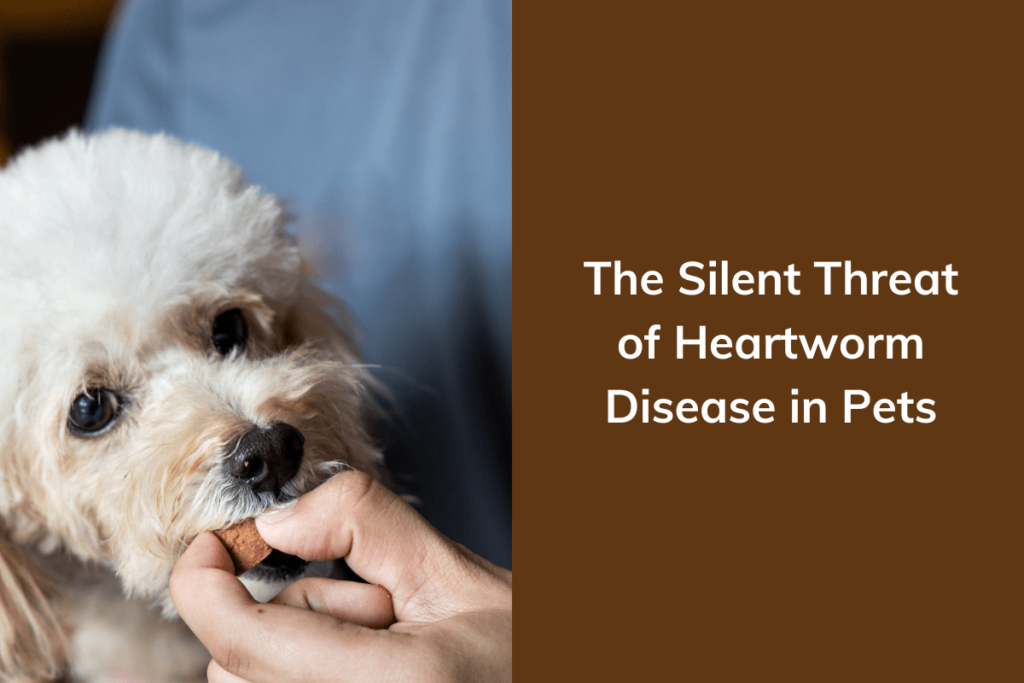Heartworm disease, a silent yet potentially deadly condition, affects pets across the United States and many parts of the world. This disease, caused by foot-long worms, can lead to severe lung disease, heart failure, and damage to other vital organs. As pet owners, understanding this disease’s intricacies is crucial for our furry friend’s well-being. As pet owners, it’s essential to understand the ins and outs of this disease so we can take good care of our furry friends.

How is heartworm disease transmitted from one pet to another?
The mosquito is the primary culprit behind the spread of heartworm disease. When a mosquito bites an infected animal, it picks up microscopic baby worms called microfilaria. These baby worms mature over 10 to 14 days into infective stage larvae within the mosquito. When this infected mosquito bites another pet, it transmits the larvae, which then take about six months to mature into adult heartworms inside the new host. In dogs, these worms can live for 5-7 years, while cats can survive for 2-3 years.
The initial stages of heartworm infection are often silent. When a pet is first infected, the young worms embark on a long migration, taking about five to seven months. The worm grows, matures, and prepares to reproduce during this period. All the while, the host pet remains oblivious to this invasion.
Symptoms and Impact
In Dogs: As the disease progresses, symptoms begin to manifest. Dogs may develop:
- A mild but persistent cough
- Reluctance or fatigue after moderate activity
- Decreased appetite and weight loss
- Fluid accumulation in the abdomen or chest
- Nosebleeds
- In severe cases, sudden death
Heartworms in dogs lead to inflammation in the pulmonary arteries and surrounding lung tissue. This inflammation, combined with the physical blockage caused by the worms, can lead to significant respiratory distress. Dead heartworms can cause even more damage, leading to blockages and further complications.
In Cats: Cats exhibit different symptoms, often more subtle or dramatic. They may experience:
- Coughing or asthma-like symptoms
- Periodic vomiting
- Lack of appetite or weight loss
- Difficulty walking or fainting
- Fluid accumulation in the abdomen
In cats, even immature worms can cause significant damage, leading to a condition known as heartworm-associated respiratory disease (HARD).
Prevention and Treatment
Prevention remains the most effective strategy against heartworm disease. Regular check-ups, annual testing, and monthly preventatives are essential. The American Heartworm Society recommends testing pets every 12 months and administering heartworm-preventive medication year-round.
Treatment in Dogs: If a dog tests positive, the treatment involves several steps, including:
- Confirming the diagnosis with additional tests.
- Restricting physical activity to prevent further complications.
- Stabilizing the dog’s condition with appropriate therapy.
- Administering treatment to kill the worms.
- Post-treatment testing to ensure all heartworms have been eliminated.
Treatment in Cats: Unfortunately, cats have no approved drug therapy for heartworm infection. The focus is on stabilizing the pet and determining a long-term management plan. Hospitalization, intravenous fluids, and other supportive therapies might be necessary in severe cases.
The Importance of Awareness
Heartworm disease is a growing concern, with cases reported in all 50 states. Factors like climate variations, the presence of wildlife carriers, and the relocation of infected pets contribute to its spread. Both outdoor and indoor pets are at risk, making prevention paramount.
While silent in its initial stages, heartworm disease can have devastating consequences for our pets. As responsible pet owners, we must stay informed, ensure regular check-ups, and administer preventive measures. By doing so, we can protect our furry companions from this silent threat and ensure they lead healthy, happy lives.
Take Action Against Heartworms at Heritage Animal Clinic
Heartworm disease might be silent, but its effects can be devastating. Heritage Animal Clinic is dedicated to ensuring your pet’s heart beats strong and free from the threat of heartworms. Our team of experts is equipped with the knowledge and tools to provide comprehensive heartworm testing, prevention, and treatment.
Take action today! Ensure your pet’s heart remains in a heartworm-free zone.Book an appointment with Heritage Animal Clinic now, and let us be your partner in safeguarding your pet’s health and happiness.
WHERE YOU AND YOUR PETS FEEL AT HOME
HERITAGE ANIMAL CLINIC
Heritage Animal Clinic is a privately owned veterinary clinic providing individualized care for dogs and cats in Madison, Huntsville, Athens, Decatur, Hartselle, and the surrounding area. We offer pet wellness exams, dermatology for pets, behavioral and dietary counseling, preventative pet care, pet dental care, in-house diagnostics, dog and cat bathing, and more.







